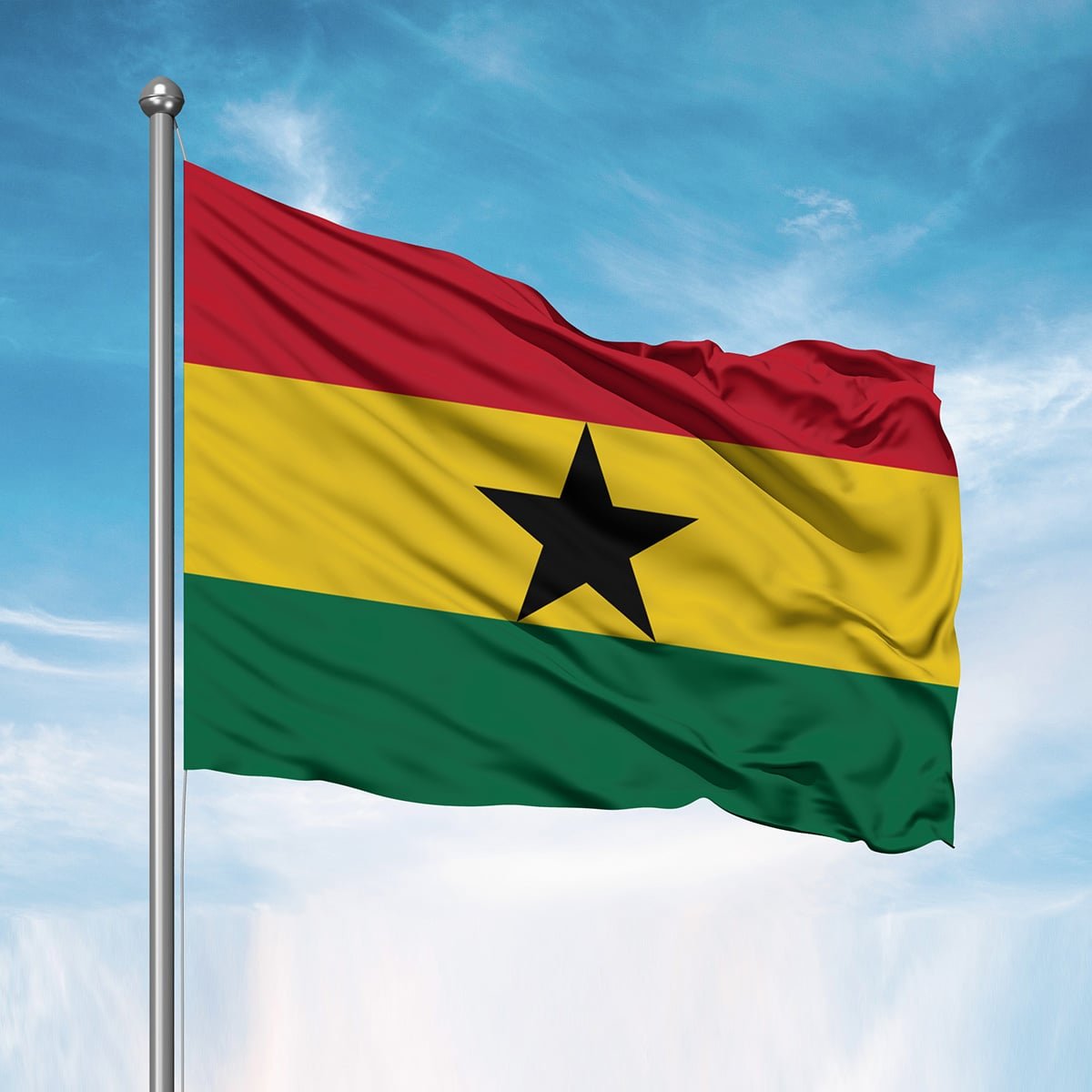Ever wondered where ancient traditions meet modern vibrancy? Look no further than Ghana, West Africa’s best-kept secret! This nation is full of cultural richness, stunning landscapes, and economic buzz. It’s a place that will make you wonder why it’s not more popular.
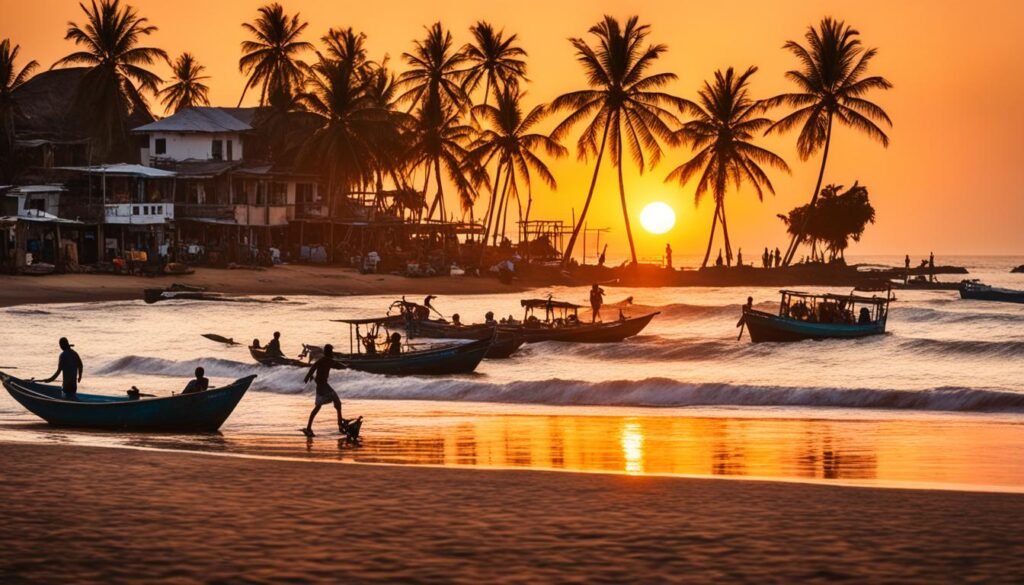
From the lively streets of Accra to the beautiful beaches along the coast, Ghana has it all. Once known as the Gold Coast, it has grown into a symbol of progress. Yet, it still holds onto its deep history.
Are you ready to explore a place where kente cloth tells stories, highlife music sets the beat, and jollof rice fills the air? Get ready for a fun journey through Ghana. Every corner has a new surprise, and every smile tells a story of West African charm.
Key Takeaways
- Ghana is a vibrant country in West Africa with rich cultural heritage
- Accra, the capital city, is a hub of modern Ghanaian culture
- Ghana’s history includes its transformation from Gold Coast to independent nation
- The country boasts diverse landscapes and emerging economic significance
- Ghanaian culture is characterized by colorful traditions, music, and cuisine
Welcome to Ghana: Africa’s Golden Child
Ghana shines brightly in West Africa, with its deep history and lively culture. Known as the Gold Coast before, it’s now a leader in growth and beauty.
A Brief Introduction to the Land of Gold
Ghana’s charm is more than its golden history. It’s a mix of different landscapes, from green forests to sandy beaches. The Volta River, a key part of Ghana, supports its growth and cares for its land.
From Gold Coast to Ghana: A Historical Snapshot
The name Gold Coast came from its rich gold. In 1957, it became Ghana, Africa’s first free nation. This change started a new chapter, leading to great economic growth.
Geography and Climate: What to Expect
Ghana is a paradise for nature fans. It has a tropical climate, ideal for exploring all year. From the coast to the north, each area has its own special features.
| Region | Climate | Key Features |
|---|---|---|
| Coastal | Warm and Humid | Beaches, Fishing Villages |
| Central | Tropical | Rainforests, Volta River |
| Northern | Hot and Dry | Savannas, Wildlife |
Ghana’s varied landscapes and deep history make it an exciting place to visit. Whether you like its beaches, culture, or business chances, Ghana offers an adventure you won’t forget.
Accra: The Vibrant Heart of Ghana
Accra, Ghana’s capital, is full of energy and charm. It’s the heart of tourism in the country. You’ll find everything from lively markets to top museums here.
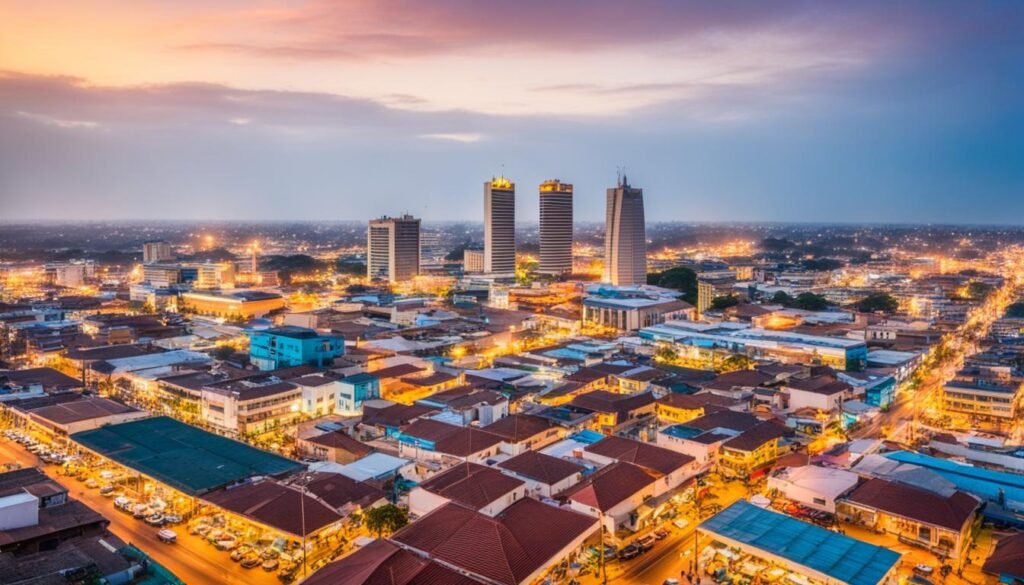
The city’s markets are always buzzing. Makola Market is a huge bazaar that shows off Ghana’s culture. You can find handwoven kente cloth and spices there. Art lovers should check out the Artists Alliance Gallery for modern Ghanaian art.
History fans will love the National Museum of Ghana. It has many artifacts that tell the country’s story. The Kwame Nkrumah Memorial Park is a peaceful spot that honors Ghana’s first president.
“Accra is a city where tradition meets modernity, creating a unique tapestry of experiences for visitors.”
At night, Accra comes alive with music and fun. You can dance to highlife and Afrobeats in bars and clubs. Food lovers should try local dishes at Oxford Street’s many restaurants.
| Attraction | Type | Best Time to Visit |
|---|---|---|
| Makola Market | Shopping | Morning |
| National Museum | Culture | Afternoon |
| Oxford Street | Nightlife | Evening |
Accra is a mix of history, culture, and modern life. It’s a place you must visit. Its friendly vibe and many attractions make sure you’ll have a trip you won’t forget.
Ghanaian Culture: A Tapestry of Traditions
Ghana’s culture is a mix of old customs and new influences. It’s full of colorful textiles and lively rhythms. This heritage draws in both visitors and locals.
Kente Cloth: Woven Stories of Heritage
Kente cloth is a key symbol of Ghanaian pride. It comes from the Akan people and is more than just clothes. It’s a form of art you can wear. Each pattern has deep meanings, telling stories of virtues, events, or sayings.
Highlife Music: The Soundtrack of Ghana
Highlife music is Ghana’s soul. It mixes African beats with Western sounds, creating a sound that makes you want to dance. This music has gone from local bars to the world stage, putting Ghana on the map.
Festivals and Celebrations: A Year-Round Party
Ghana’s festivals fill the calendar. The Adae Kese honors ancestors, and Homowo thanks the gods for food. These events show off Ghana’s culture with dances, drums, and lots of kente cloth.
“In Ghana, every day is a celebration of life, music, and tradition.”
Whether you’re looking at kente cloth, dancing to highlife, or joining a festival, Ghana’s culture is unforgettable.
Culinary Adventures: Tasting Ghana’s Flavors
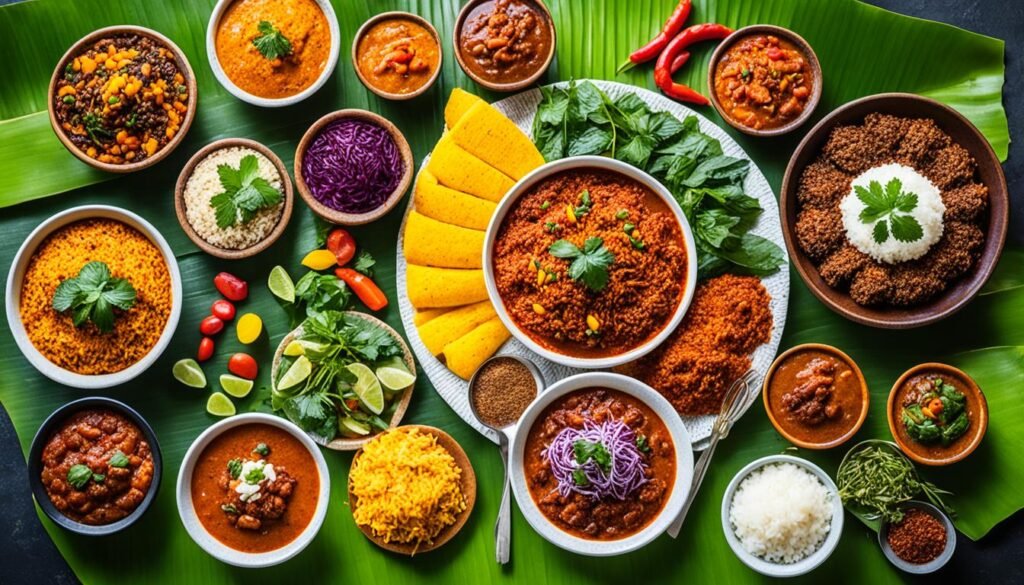
Ghana’s food scene is a treat for your senses. It shows off the country’s rich culture and its natural gifts. The flavors are a mix of spicy, savory, and sweet.
Fufu is a key dish in Ghana, made from cassava and plantains. It’s a doughy food often eaten with soups like groundnut or light soup. Jollof rice, a spicy dish, brings people together and sparks debates on who makes it best.
By the coast, seafood lovers find paradise. Grilled tilapia with banku, a fermented corn dough, is a top choice. For those who like a little spice, kelewele – fried plantains – is a great snack.
Ghana is a big producer of cocoa, the second in the world. This has a big impact on the economy and food traditions. You’ll find everything from chocolate drinks to dishes with cocoa in them.
“In Ghana, food is not just sustenance; it’s a celebration of life, culture, and community.”
Trying Ghanaian food, whether on the street or in a fancy restaurant, is an adventure. It leaves you wanting more.
The Ashanti Kingdom: Gold, Power, and Legacy
The Ashanti Kingdom is a symbol of African brilliance and strength. It’s known for its deep culture and huge gold mines. This empire greatly influenced Ghana’s history. Let’s explore the golden world of the Ashanti.
Kumasi: The Seat of Ashanti Royalty
Kumasi is at the heart of the Ashanti Kingdom, filled with royal grandeur. This city is home to the Manhyia Palace, where the Asantehene (Ashanti King) lives. People can visit the palace museum to see how the Ashanti monarchs lived.
Golden Stools and Adinkra Symbols
The Golden Stool is a symbol of the Ashanti’s power. It’s made of pure gold and is never touched by the ground. Adinkra symbols, found on colorful cloths, share stories of wisdom and cultural values.
Modern Ashanti: Tradition Meets Progress
Today, the Ashanti Kingdom mixes old traditions with new progress. Gold mining is still key, with both old and new methods used. Kumasi’s markets show off traditional crafts and modern items, showing the changing Ashanti culture.
| Aspect | Traditional | Modern |
|---|---|---|
| Gold Mining | Small-scale panning | Large industrial operations |
| Governance | Absolute monarchy | Constitutional monarchy |
| Trade | Local markets | Global exports |
The Ashanti Kingdom’s legacy is still alive, connecting Ghana’s past and present. From Kumasi’s royal seat to the gold mines, the Ashanti spirit of innovation and tradition shines on.
Nature’s Playground: Ecotourism in Ghana
Ghana is a paradise for nature lovers with its lush landscapes and rich biodiversity. It has many ecotourism spots that highlight its natural beauty and support sustainable travel.
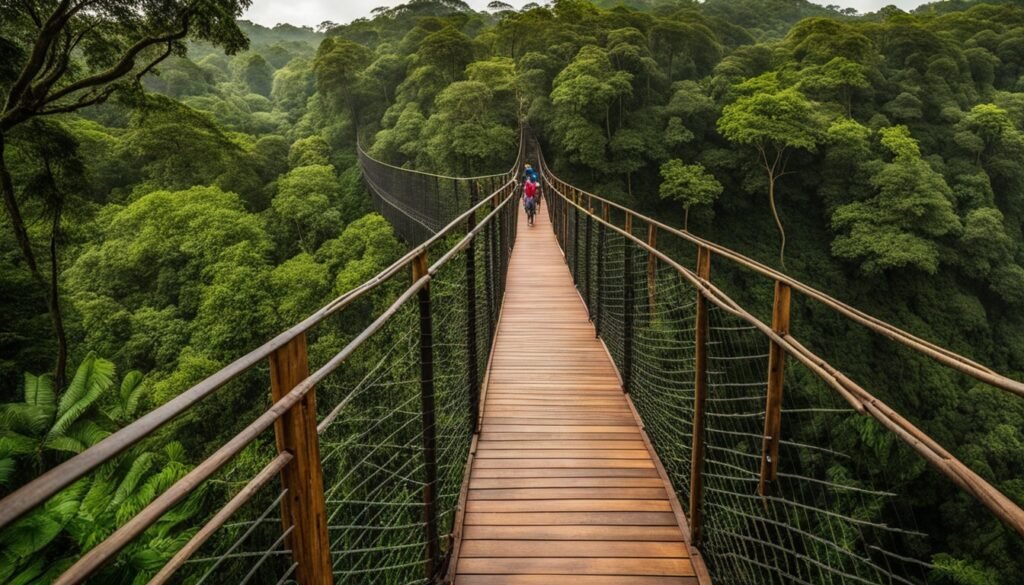
Kakum National Park is a key spot for ecotourism in Ghana. It covers 375 square kilometers of untouched rainforest. The park is famous for its canopy walkway, 30 meters high in the trees. Visitors can walk on seven bridges and see amazing views and wildlife.
There are many other natural spots in Ghana too:
- Mole National Park: Home to elephants, antelopes, and over 300 bird species
- Lake Volta: The world’s largest artificial lake, perfect for boat tours and fishing
- Wli Waterfalls: Ghana’s highest waterfall, nestled in the Agumatsa Wildlife Sanctuary
Ghana is dedicated to protecting its nature through ecotourism. Parks and reserves use local guides. This helps the community and supports responsible tourism.
| Ecotourism Destination | Main Attraction | Best Time to Visit |
|---|---|---|
| Kakum National Park | Canopy walkway | November to April |
| Mole National Park | Wildlife safaris | December to March |
| Lake Volta | Boat tours | Year-round |
| Wli Waterfalls | Hiking trails | April to October |
Ghana is growing its ecotourism, offering more ways to enjoy nature. From exciting canopy walks to peaceful lake cruises, there’s something for every nature lover.
Ghana: A Rising Star in West African Economics
Ghana’s economy is a bright spot on the African continent. This West African nation is a powerhouse, thanks to its rich resources and innovative spirit. Let’s explore the main sectors driving Ghana’s economic growth.
Cocoa Production: Sweet Success
Ghana is known for its world-famous cocoa beans. It’s the second largest producer of cocoa globally, accounting for about 20% of the world’s supply. This success is a big part of Ghana’s GDP and supports millions of farmers with jobs.
Gold Mining: Digging into Prosperity
Gold mining has been key to Ghana’s economy for a long time. It’s the biggest gold producer in Africa, with lots of gold still waiting to be found. Thanks to modern mining methods, production has gone up. This has created more jobs and helped the economy grow.
| Year | Gold Production (tonnes) | Economic Impact (USD billions) |
|---|---|---|
| 2018 | 130 | 5.2 |
| 2019 | 142 | 6.1 |
| 2020 | 138 | 5.9 |
Tech and Innovation: Ghana’s Digital Revolution
Ghana’s tech scene is exploding. Accra, the capital, is now a center for startups and tech innovation. Entrepreneurs are coming up with digital solutions for Africa’s challenges. This tech boom is drawing in foreign investment and creating jobs for young Ghanaians.
Ghana’s diverse economy and forward-thinking make it a star in West African economics.
Historical Landmarks: Ghanaian Time Capsules
Step into Ghana’s past and you’ll find yourself tripping over historical landmarks like a clumsy time traveler. Cape Coast Castle and Elmina Castle stand as stark reminders of a tumultuous era. Their walls echo with stories that shaped the nation.
These fortresses, once hubs of the transatlantic slave trade, now serve as powerful museums and tourism hotspots. They tell the stories of a dark past but also of resilience and strength.
Ghana’s history isn’t just etched in stone; it’s woven into the fabric of everyday life. The English language, a colonial leftover, has become the country’s linguistic Swiss Army knife. It’s the official language, used in government, education, and even for ordering your fufu at the local chop bar.
This linguistic legacy has turned Ghana into a global communicator. It makes it easy for English-speaking tourists to navigate the country. You can easily find your way around, from bustling markets to peaceful nature spots.
From ancient Ashanti kingdoms to colonial outposts, Ghana’s historical landmarks are like a greatest hits album of West African history. They’re not just dusty old buildings – they’re living, breathing time capsules that continue to shape Ghana’s identity.
So pack your bags, brush up on your English, and get ready for a historical rollercoaster ride through the heart of West Africa. You’ll experience the beauty of Ghana’s past and its vibrant culture.
FAQ
What are some must-see attractions in Accra?
Accra, Ghana’s vibrant capital, has lots to offer visitors. Start at the National Museum to see Ghana’s rich culture. Then, visit Makola Market for a taste of local life with its sights, sounds, and smells.
For a fun night out, go to Osu. It’s full of bars, clubs, and street food.
What is Kente cloth, and why is it so significant in Ghanaian culture?
Kente cloth is a special fabric that symbolizes Ghanaian culture. Each pattern and color has deep meaning, often tied to history or philosophy. Ghanaians wear Kente with pride on special days and at festivals.
Can you recommend some delicious Ghanaian dishes to try?
Yes! Ghanaian food is full of flavors and traditions. Try Kenkey with fried fish and spicy sauce first. Then, enjoy Jollof rice, a tomato-based rice dish, and don’t miss Red Red, a stew with black-eyed peas and fried plantains.
What is the significance of the Ashanti Kingdom in Ghana’s history?
The Ashanti Kingdom was a powerful empire in Ghana from the 17th to the late 19th century. It was centered in Kumasi and was known for gold mining and Adinkra symbols. Their legacy still influences Ghanaian culture and traditions today.
Where can I experience Ghana’s natural beauty and wildlife?
For nature lovers, Ghana has many places to visit. Don’t miss Kakum National Park for its canopy walkway in the rainforest. Mole National Park is great for seeing elephants, antelopes, and birds in the wild.
What role does cocoa production play in Ghana’s economy?
Cocoa is very important to Ghana’s economy, as it’s a top cocoa exporter. The country’s fertile lands and climate are perfect for cocoa. Cocoa farming supports many communities and helps the economy grow.
